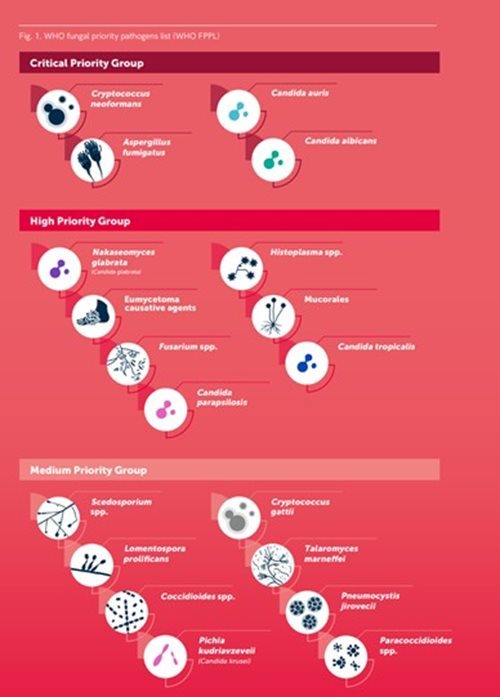
More and more fungal infections are no longer treatable with drugs. This increasing resistance is becoming a growing problem for patients and doctors. In an advice to the government, the Health Council calls it "a serious threat to health care" and calls for the establishment of a Knowledge Platform on Fungal Diseases. The Council further states: address sources of resistance formation in the environment, limit the use of fungicides in agriculture and establish a National Action Plan on Fungal Resistance. Action is urgently needed.
Fungi are useful in the production of bread, beer, cheese, wine, drugs and chemicals. On the other hand, some three hundred of the probably millions of species of fungi also cause diseases in humans. For example, a quarter million Dutch people suffer from a serious, chronic fungal infection on skin, nails or mucous membranes. And every year about 3,000 people contract a difficult-to-treat, life-threatening invasive fungal infection. The Health Council notes that drugs that fight such fungal infections (antimycotics/fungicides) are increasingly ineffective. Fungi are becoming increasingly insensitive (resistant). Not only in the Netherlands, but worldwide.
Large-scale use in agriculture
One cause of this increasing resistance is the use of fungicides in agriculture. Research by physician microbiologist Paul Verweij from Radboudumc and colleagues showed that around the year 2000, patients with impaired immune defenses first became infected with resistant variants of the fungus Aspergillus fumigatus. In the years that followed, it became clear that the resistance did not arise from hospital treatment, but from large-scale use of fungicides (fungicides) in agriculture and industry. Further research pointed toward hotspots encouraging resistance formation, such as composting and waste from flower bulbs and number of other crops containing fungicides.
Serious problem
More factors are involved, write Verweij and ten other experts who drafted the Opinion. Globalization and possibly climate change also play into the hands of resistance. For example, the fungus Candida auris, which first appeared in 2009 and is resistant to several pesticides, is causing serious problems in more and more countries. Furthermore, the multi-resistant skin fungus Trichophyton indotineae is advancing worldwide, including in the Netherlands. The problems with fungal resistance are not new. In October 2022, the World Health Organization presented a list (see illustration) of dangerous, pathogenic fungi to guide further research and public health policies.
National and preferably global approach
Dutch media also already paid attention to the issue, such as EenVandaag in the report Infection with resistant fungus almost killed Stefani: 'I didn't know how deadly it actually was'. The reportage makes it clear that many people do not know the danger of resistant mold, but that it is already on the radar politically. For example, Ernst Kuipers - then Minister of Health - reveals that it is a serious problem that needs to be addressed on many fronts and preferably internationally.
Hardly any effective policy
Yet the Health Council observes, ‘Effective policy is hardly getting off the ground so far because of the lack of interest in fungal infections and because the leading role in tackling the issue has not been invested anywhere nationally nor internationally’. The comparison with antibiotic resistance comes to mind. According to the Council, the Netherlands did have successful policy on that. Earlier this year, this policy was refreshed with the National Antimicrobial Resistance Action Plan 2024-2030, which was presented to the House of Representatives on May 16, 2024.
WHO priority list of pathogenic fungi:

Action is needed
According to the Advisory Committee, action is therefore ‘urgently needed’. One way to do this is to appoint a coordinator who will really tackle the problem and establish a Knowledge Platform on Fungal Diseases. That Knowledge Platform can draw up a National Action Plan on Fungal Diseases as an extension of the already presented National Action Plan on Antimicrobial Resistance.
See also Health Council Advice Resistance undermines treatment of fungal infections
-
Want to know more about these subjects? Click on the buttons below for more news.
More information
Pieter Lomans

persvoorlichter






